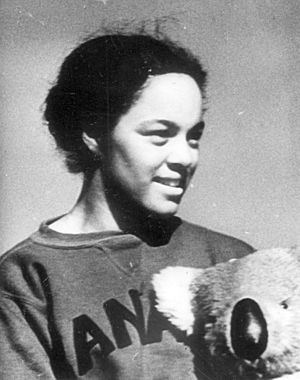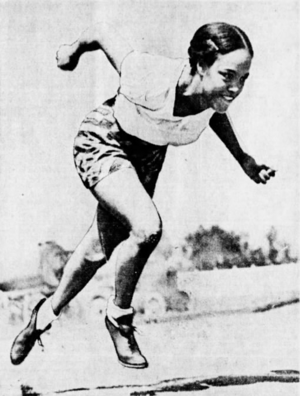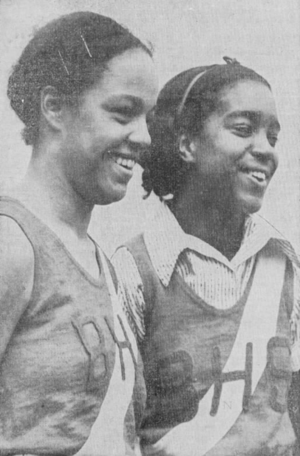Barbara Howard (athlete) facts for kids

Barbara Howard at the British Empire Games (1938)
|
|||||||||||||||||
| Personal information | |||||||||||||||||
|---|---|---|---|---|---|---|---|---|---|---|---|---|---|---|---|---|---|
| Nationality | Canadian | ||||||||||||||||
| Born | May 8, 1920 Vancouver, British Columbia |
||||||||||||||||
| Died | January 26, 2017 (aged 96) | ||||||||||||||||
| Education | B.Ed, University of British Columbia | ||||||||||||||||
| Occupation | Teacher | ||||||||||||||||
| Sport | |||||||||||||||||
| Sport | Sprinter | ||||||||||||||||
|
Medal record
|
|||||||||||||||||
Barbara Howard (May 8, 1920 – January 26, 2017) was a Canadian sprinter and a dedicated teacher. She grew up in Vancouver, British Columbia. Barbara became famous as a sprinter in high school. She even broke a record for the 100-yard dash!
Barbara was chosen for the Canadian track and field team in 1938. This made her the first Black woman to represent Canada in international sports. At the 1938 British Empire Games, she helped her team win silver and bronze medals in relay races. Sadly, World War II stopped many sports events. This meant Barbara could not compete internationally again.
After her sports career, Barbara became a teacher. She taught elementary school for over 40 years. She was also the first person from a visible minority group hired by the Vancouver School Board. Barbara Howard is now in several sports halls of fame. These include the BC Sports Hall of Fame and Canada's Sports Hall of Fame.
Contents
Barbara Howard's Early Life
Barbara Howard was born on May 8, 1920. Her hometown was Vancouver, British Columbia. She had four older brothers and sisters. Her parents were Catherine "Cassie" Scurry and Samuel Howard. Her family lived in the Grandview area of East Vancouver. When Barbara was eight, her father passed away. Her uncle then helped support the family.
Becoming a Sprinter
Barbara's amazing speed was first noticed when she was in elementary school. She would often run the last few blocks to get to class on time! She became the running champion at Laura Secord Elementary. Later, at Britannia High, she was known as one of Vancouver's fastest sprinters.
In September 1937, Barbara became famous across Canada. She ran 100 yards in just 11.2 seconds. This was faster than the record for the British Empire Games at the time. Barbara was only 17 years old. She earned a spot on Canada's track and field team for the 1938 British Empire Games. She was the first Black woman to represent Canada in international sports.
Competing in Australia
Barbara and her teammates traveled to Sydney, Australia, for the Games. Their journey on the Aorangi ocean liner took 28 days. It was Barbara's first time leaving Vancouver. When they arrived in Sydney, Barbara received a lot of attention. Australian media and fans were excited to meet a Black athlete. Australian Women's Weekly called her the "most popular girl" on the Canadian team. Barbara loved her time there and received many gifts, including a toy koala bear.
The pressure of the Games was very high. Barbara also ate unfamiliar Australian foods. This made it hard for her to perform her best. She finished sixth in the 100-yard dash. Barbara was disappointed with her result. However, she helped Canada win medals in the relay races. Her team won silver in the 440-yard relay. They also won bronze in the 660-yard relay. Her teammates were Jeanette Dolson, Aileen Meagher, and Violet Montgomery.
Barbara wanted to continue her international track career. But World War II started. The Olympics in 1940 and 1944 were cancelled. This meant her chance to compete again passed.
Barbara's Teaching Career
After high school, Barbara trained to be a teacher. She got her first teaching job in Port Alberni. In 1941, she returned to Vancouver. She became the first person from a visible minority hired by the Vancouver School Board. Barbara taught at elementary schools for 43 years.
She was a member of the Delta Kappa Gamma sorority. She also volunteered with Canadian Girls in Training. In 1959, Barbara earned a Bachelor of Education degree. She got this from the University of British Columbia.
Barbara's former students remembered her as a dedicated teacher. She made learning fun and creative. For example, she had students plan field trips and make their own films. She did not often talk about her past as a sprinter. But one time, her students from the 1970s saw her athletic side. They recalled:
Physical fitness was a priority and softball was our daily game. We hadn't known her impressive sports background, until the day she suggested boys versus girls, with her as captain and she ran round the bases in skirt and heels, laughing her head off as she hit the winning home run for the girls team!
Barbara retired from teaching in 1984. She continued to volunteer with the United Church. She led exercise classes and peer counseling at her local community center. In 2010, she received a Remarkable Woman Award. This was for inspiring others in her community.
Later Life and Legacy
In her later years, people became more interested in Barbara's story. Her sports achievements were recognized. She was inducted into the Burnaby Sports Hall of Fame in 2011. She also joined the BC Sports Hall of Fame in 2012. In 2015, she was inducted into Canada's Sports Hall of Fame.
In 2018, the City of Vancouver honored her. They announced a park would be renamed Barbara Howard Plaza. This park is near the Cambie Street Bridge. Barbara Howard passed away on January 26, 2017. Her legacy as a pioneering athlete and dedicated educator lives on.
 | Janet Taylor Pickett |
 | Synthia Saint James |
 | Howardena Pindell |
 | Faith Ringgold |



